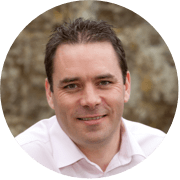Unfortunately, running a clinic isn’t all about the treatments; you have so many different hats to wear that a lot of the time the treatments almost get in the way of building your business, while you deal with marketing, admin, unreasonable customers, cash flow keeping you awake at night (not sure who said this, but you know you have a business when you’re awake at 3am wondering if you’ve still got a business). Being in business is a minefield for the caring soul and none of the training you did to get you where you are now ever prepared you for the turbulent seas you can find yourself in.
The variety of different roles or ‘hats’ that you need to wear within any clinic, especially when first starting out, can be overwhelming, and many clinic owners and entrepreneurs freeze before they even start. When I’m giving talks I often share the tale of the university lecturer who, in front of his students, produces a large glass jar that he fills with golf balls. He then asks his students “is the jar full?” The students all agree that the jar is full but the lecturer then pulls some marbles out from under the desk and pours them into the jar…
The marbles fill the gaps between the golf balls, and again, the lecturer asks “is the jar full?” Once more the students agree that yes the jar is definitely now full, but the lecturer pulls out a bag of sand and proceeds to pour that into the jar too. He again asks the students “is the jar full?” and the students – who by this point are less inclined to say it is, sit quietly. The lecturer then pulls out a beaker of water and tips the water in the jar and again asks if the jar is full…
He points out that life is very like the jar – the important things are the golf balls and the marbles, with the sand and the water representing the other activities that we get involved with. If you’re not careful, you can fill your jar with sand and water and leave no room for the important stuff. Business is the same. Too often we get wrapped up in the actual doing – serving the customer, designing something, processing the sale – and not working on the important things which will actually grow the clinic into something that supports us moving forwards.
Ultimately if you’re looking to build a successful clinic you have to work towards becoming less of a doer and more of a business owner, and this requires just as much effort on your part as when you originally studied your creative trade. It’s not easy to let go and is doubly hard if you’re really good at what you do, as you’ll struggle to find people as good or better than you and you may find yourself wanting to take jobs back.
I’ve seen this happen in quite a few clinics, where the owners expand and then become tempted to shrink again because the quality of what’s being done isn’t to their high standards and the excuse of “it’s just quicker to do it myself” rears its ugly head.
I mentioned the power of thought earlier, and how you think is impacted by who you decide to mix with and what information you decide to consume. Just reading this book, even if you don’t agree with everything, will stretch your thinking and no matter how hard you try you could never go back to how you thought before.
And this is something advocated by David Hyner. If you’ve never heard of him, he’s well worth looking up. He’s interviewed some of the highest achievers and most effective people from the world of sport, music, arts, politics and enterprise. All of these people had one thing in common and that was that they set massive goals for themselves, not what most of us are taught when it comes to goal setting; SMART, which stands for Specific, Measurable, Achievable, Realistic and Timely.
What David says is to set yourself massive goals and then start planning for them. You’re going to be setting goals anyway so why not set bigger ones than you currently have, no matter what type of clinic you have? You’ll be super busy anyway so you might as well be super busy actually building a larger clinic than you’re currently thinking of. And that’s what this book is all about. It’s about pushing you slightly further than you’re comfortable going, giving you the strategies and tools to develop a larger clinic than you would have built in the first place; and this all comes down to mindset.
Like many business owners you may be striving for a lifestyle business which doesn’t control you, you control it. You may want more time off, a shorter working week, more holidays and the business to work whether or not you’re there. And that’s perfectly reasonable – after all the true definition of a business is a commercial profitable enterprise that you can walk away from and it keeps paying you.
Yet so few clinics actually hit this target of having a lifestyle business – Daniel Priestley has met over 3000+ business owners, 70% of whom were struggling. And if you look at national statistics that’s supported, with roughly 70% of business owners never making it past a £quarter million turnover. Daniel identified that the £250,000 to £300,000 mark was the tipping point for most businesses when they move from struggling to having a lifestyle business.
Interestingly, in his presentation Daniel showed that while businesses from £0 to £300,000 were mostly struggling, businesses between £300,000 to £2million were in a sweet spot, which is where the lifestyle business exists. Bizarrely as you go to the £2million-£10million turnover bracket, business owners were struggling again because their businesses were once again different beasts and needed different systems and processes put in place. Daniel described it as you employing people and you go from 12 employees to 13; the 13th employee causes fragmentation within your workforce, people start to form cliques and communication starts to break down. Normally once over £10 million turnover the lessons have been learnt and the systems put in place so the business owners are back in that sweet spot again.
So, your ultimate aim is to get the business working without you. I’m not saying you suddenly stop doing anything and retire (unless that’s what you want), but you want to be in a position where you have choices about whether you are going to work or not. You need to know that if anything disastrous hits you, the clinic will continue on without you. More than likely, like the super-successful business owners I’ve been interviewing, you’ll continue working hard within your business and it will become a pleasure, not a chore.
Think Big like Richard Reed from Innocent drinks and you may just hit the stars, but even if you miss, you’ll be pretty high 🙂
By Alan Adams The Clinic Coach




